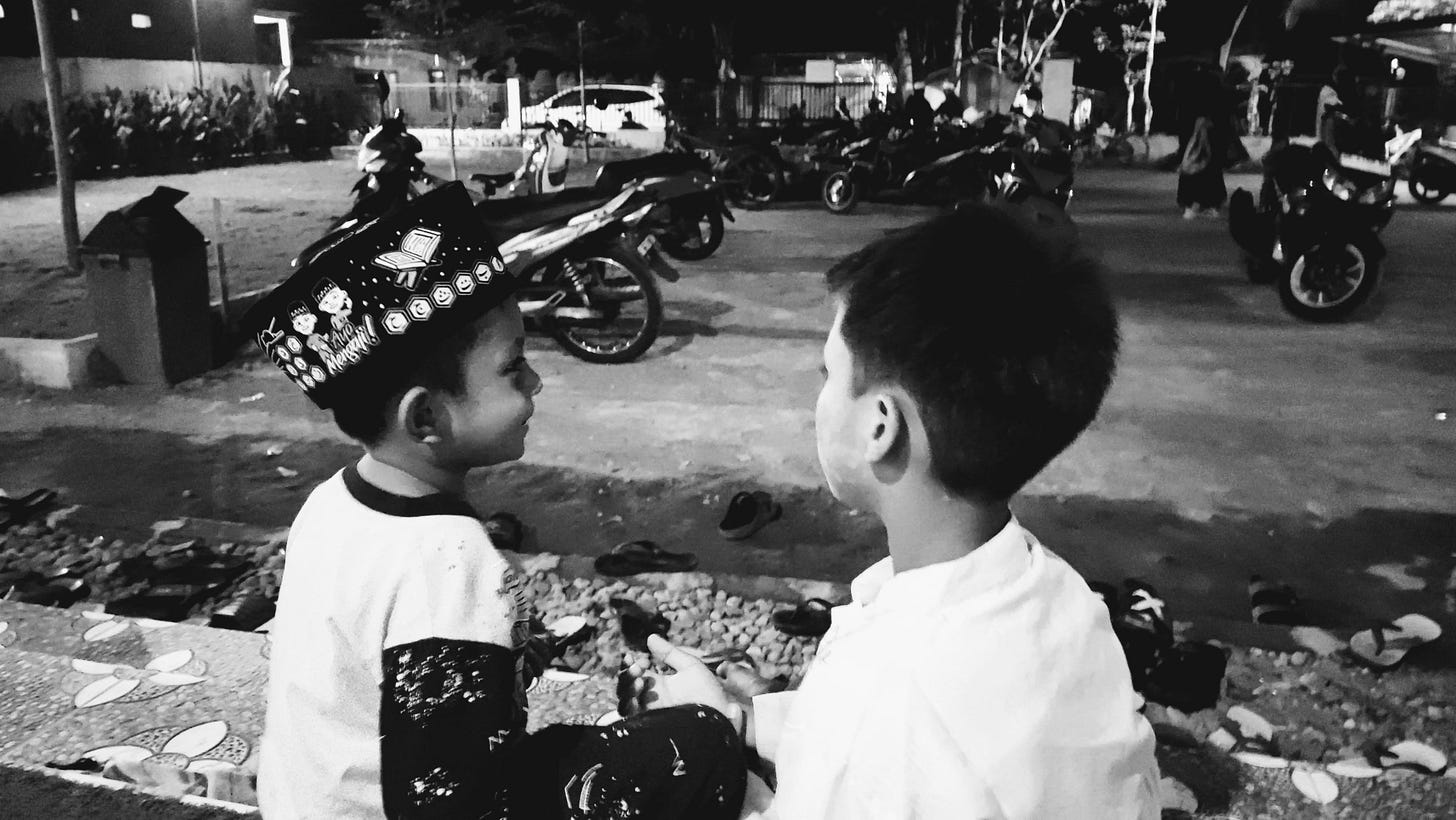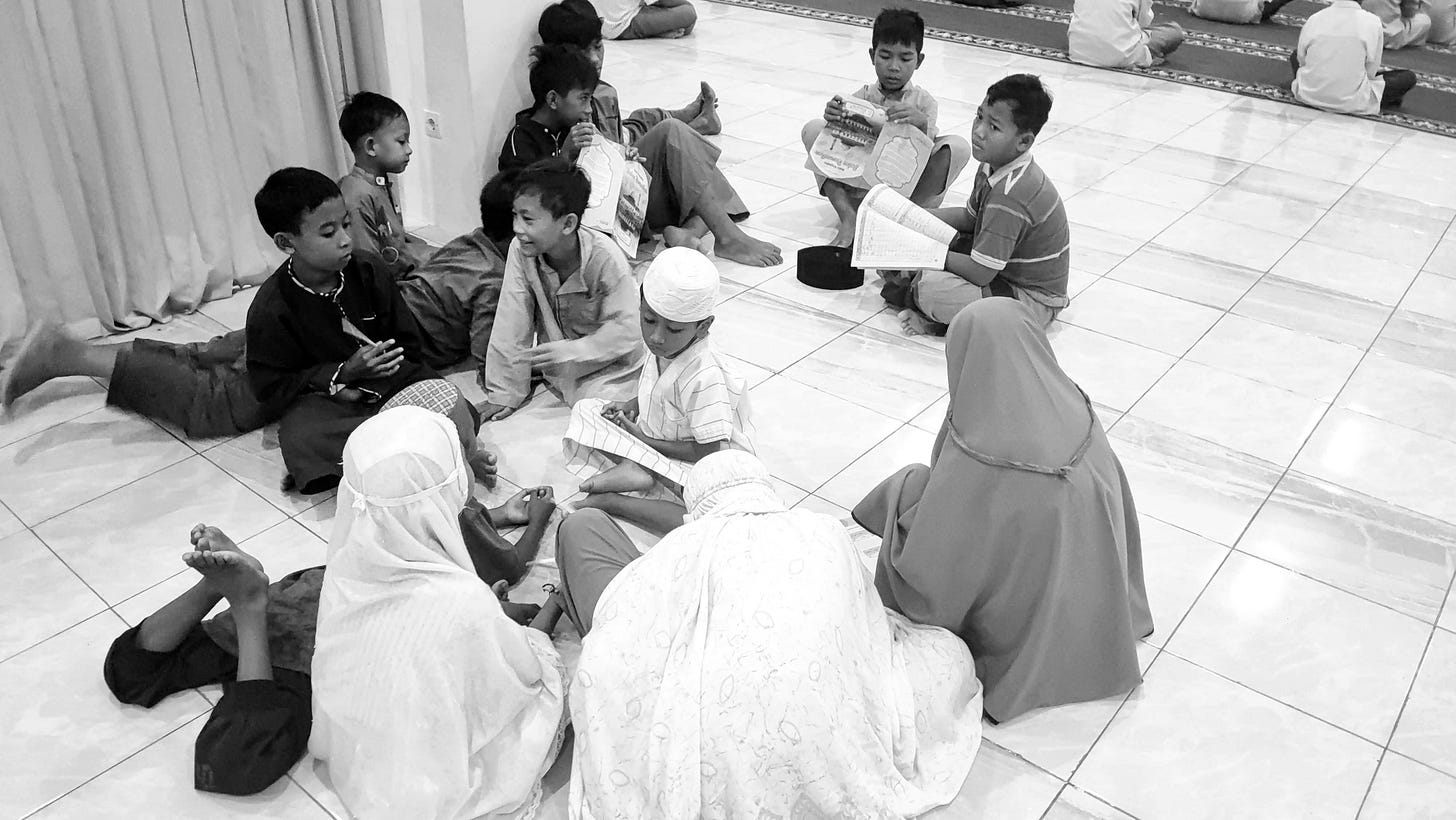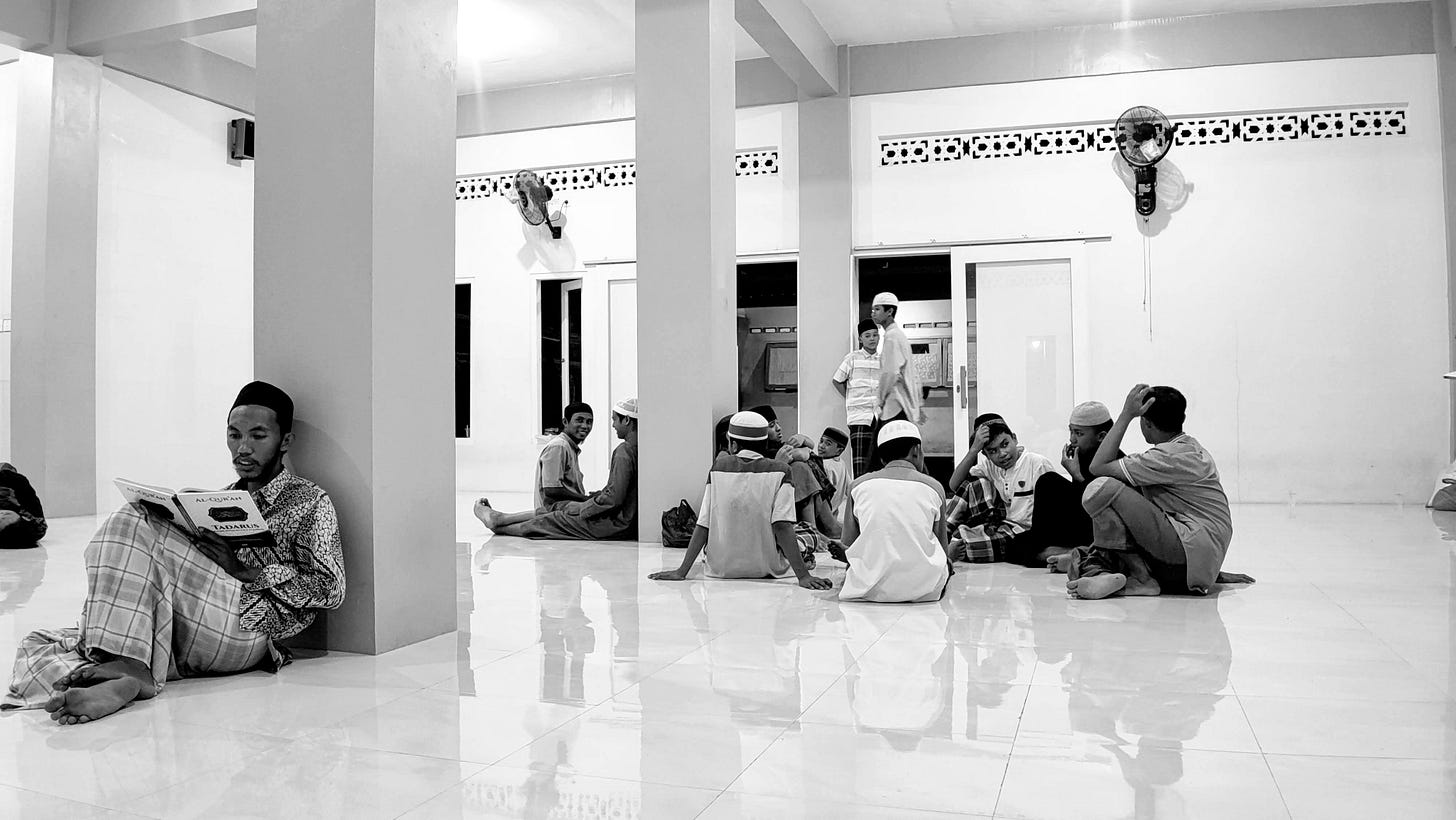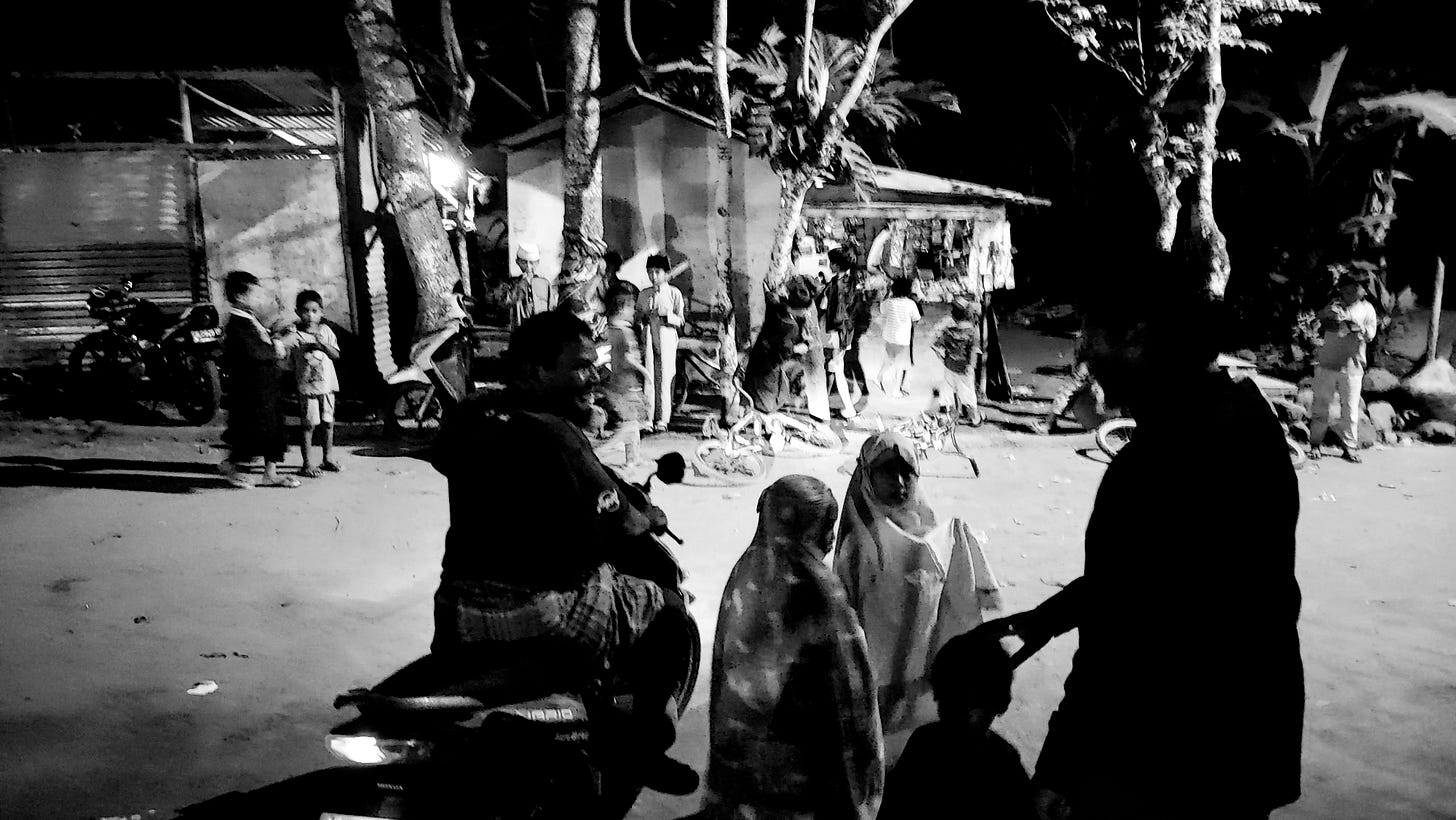My first Ramadan in Lombok
It's 8pm on Wednesday 22 March 2023. The warmth of the tropical night gently embraces my skin. It is another balmy evening on Lombok. I’m sitting with a few friends on the steps of the local masjid in Batu Layar. Batu Layar is a small village on the island and this is the closest masjid to where I stay.
A spotlight lights up the masjid grounds. The area in front of us is a buzz of activity. Lots of children running around, laughing and playing. People are still entering the masjid grounds. Men wearing the songkok (traditional black caps) and sarongs. Women and girls wearing traditional Mukhenas (prayer garments).
The outdoor covered area where we are sitting is full of people chatting.
There is a festive mood in the air.
We have finished our evening communal prayer. The community is now awaiting a very important announcement from the local imam. Has the new moon been sighted? This will mark the start of the holy month of Ramadan.
The government coordinates more than 80 moon sighting locations across Indonesia. The ministry in Jakarta makes the final decision and then conveys it across the country. This is no mean task, considering Indonesia comprises more than 5,000 inhabited islands.
The announcement is taking longer than normal. People are aware you have a short window after sunset to sight the new moon. It has already been more than 90 minutes since sunset and no news yet. Finally, they make the announcement that they have sighted the moon!
Ramadan has started.
A calmness descends upon the crowd. People start filtering into the masjid for Taraweeh, the Ramadan communal evening prayer.
It is the start of my first Ramadan in Lombok, Indonesia.
This will be the first time that I will be celebrating Ramadan outside of South Africa. It feels strange because I have always associated Ramadan with family and friends. Even though it’s an individual act of worship it is also very much a communal affair.
I will miss the taraweeh and lectures in Cape Town.
I will miss breaking fast with family and friends, or buka as we call it in Cape Town.
But, this is the first time that I will be experiencing the holy month in a majority Muslim country. At the time of writing, we have been fasting for just more than a week and it has been a very special experience.
The Ramadan atmosphere is present everywhere, you feel it in the air. From the time that you wake up in the early morning, you will hear reciting from the mosques as people get ready for the early morning prayer. In the evenings after the taraweeh salaah, one can hear children reciting at all the mosques. The young voices echo through the village streets till late into the night.
The local mall is quieter now. Interestingly, all the restaurants have set up temporary curtains around their eating areas. The food court resembles a colourful bazaar with the restaurants using different colours to cover their area. Non-Muslim customers can eat behind the curtain without feeling uncomfortable.
The roads quiet down during the day as many of the local warungs (small kiosks) close. An hour before sunset you will see activity picking up on the streets and the roadside food warungs opening. They will be preparing for the breaking of the fast.
In South Africa, we refer to “breaking” our fast at sunset. When Ramadan started, someone told me that here in Indonesia they refer to it as “opening” the fast. I found this a strange term to use. Surely, you are stopping the fast at sunset. Why use the word open?
Until I realized that the Indonesian word for open is “buka”. The same colloquial word we use in Cape Town for breaking the fast. Turns out we were actually using the word “open” all along in Cape Town.
It is also clear that in the villages the focus is around the masjid during Ramadan. It is the center of activity and where people will congregate. It becomes a meeting space for the five daily prayers. Conversations and activities continue long after the communal prayer ends.
What also gives the village a festive feeling are the children. During Ramadan children in the village will stay up late. You will find children of all ages playing at the masjid and in the roads. Everywhere you go you will see children gathering together. If you don’t see them you can hear the laughter coming from somewhere.
I asked a few of my friends about the children staying up so late during Ramadan.
"It's the one time of the year when we allow them to stay out late.”
“It’s a FUN time for the children in the village.”
“The children love this month.”
“They can stay out till 12.”
I now have a group of friends that I meet up with every night for taraweeh salaah. After taraweeh we will sit at the masjid and enjoy some of the dates and water that is donated by someone. People in the village live a very basic life so there is lots of charity happening during Ramadan.
Some nights I get invited to join a few friends for kopi (coffee) at one of their houses. It’s a short stroll from the masjid through the tight alleyways of the village to someone’s humble home. We will then sit outside on their beruga to enjoy Lombok kopi with some snacks.
(A beruga is a covered raised platform structure that you will find at many houses. It is also where they will host guests.)
Ultimately, Ramadan is a month of spiritual reconnection. We abstain from food and drink to heighten our focus on growing the inner. The physical fast has many health benefits. But the physical fast is just a means to access the much deeper benefit of this holy month. And you can be anywhere to access this deeper benefit.
You do not have to be in a “Muslim” country.
However, experiencing Ramadan in a Muslim environment has given me a new perspective on this holy month.
Experiencing Ramadan in the local villages has given me a new appreciation for the importance of charity during this holy month. It has given me a new perspective on simple living.
Now, at 57, I realize I wish I had taken time out of my busy life to experience the holy month of Ramadan in an environment like this much earlier.
The warmth and hospitality of the locals, the vibrant atmosphere and the community spirit that pervades the villages during this special month are truly special.
Regardless of your faith or belief, I highly recommend that you take the opportunity to try a spiritual practice, such as observing Ramadan, in a new and different environment.
An environment that is conducive to your specific faith or belief system.
It may just be one of the most enriching experiences of your life.
I’m looking forward to the rest of Ramadan on the island of Lombok.










